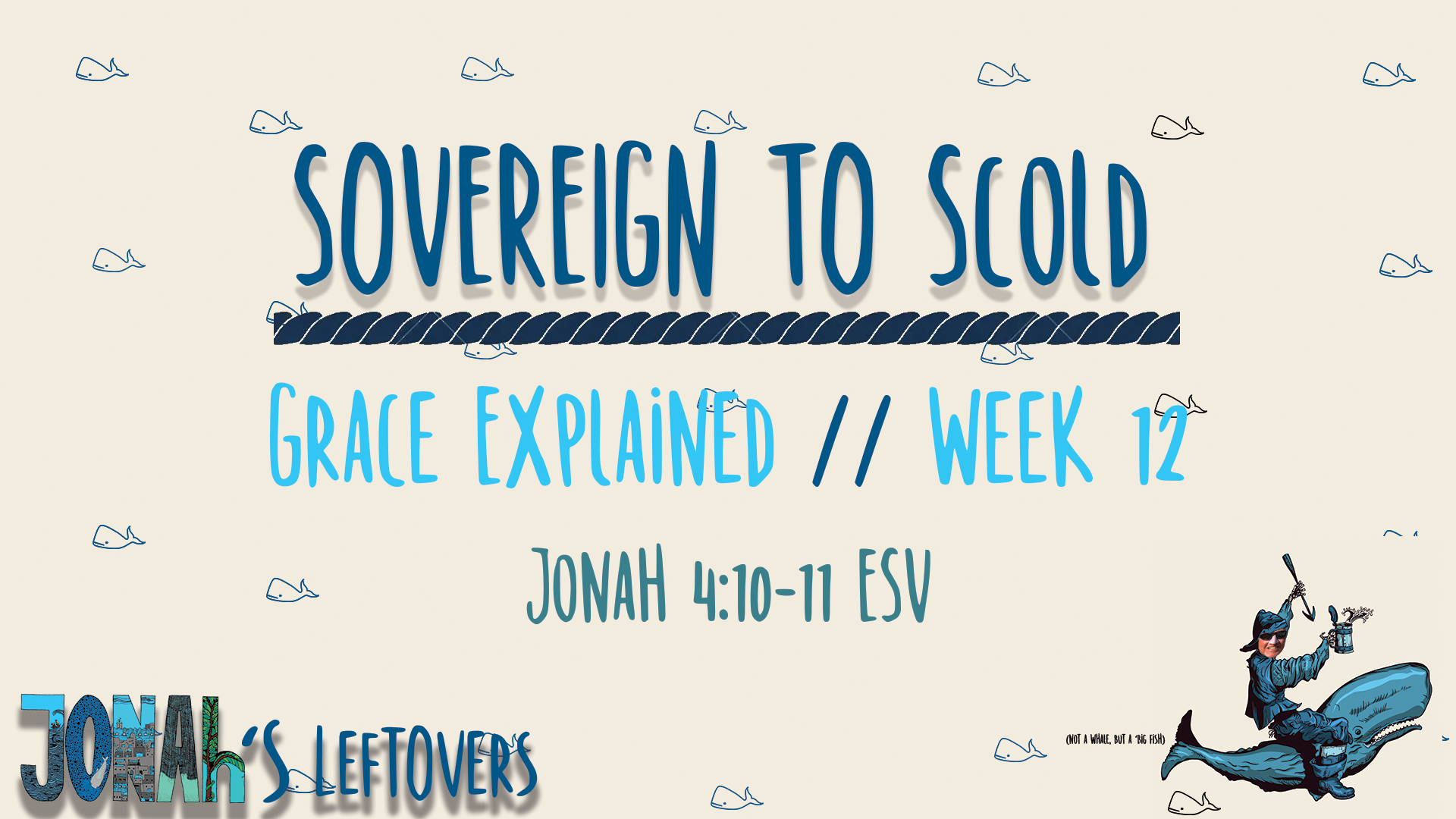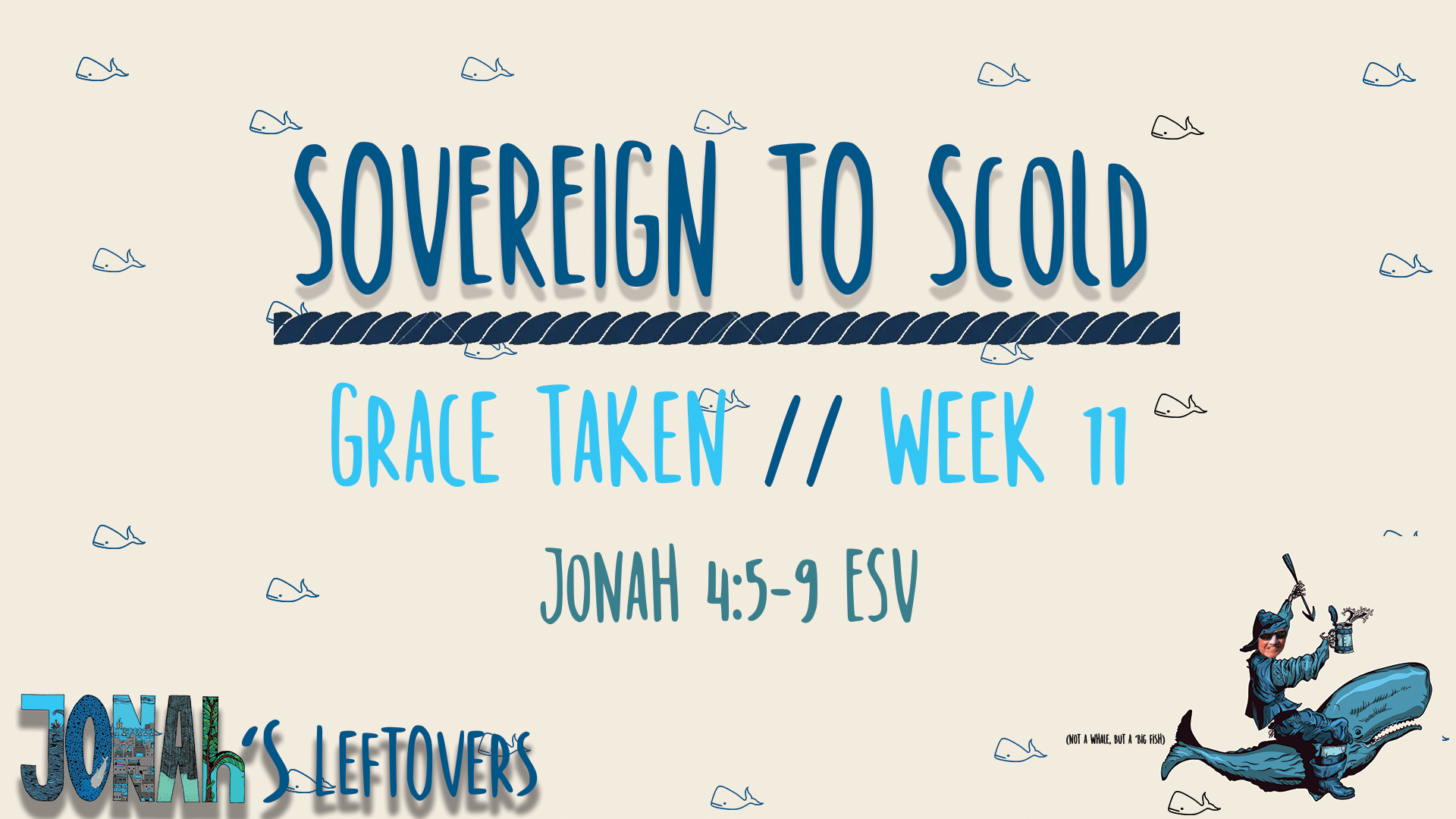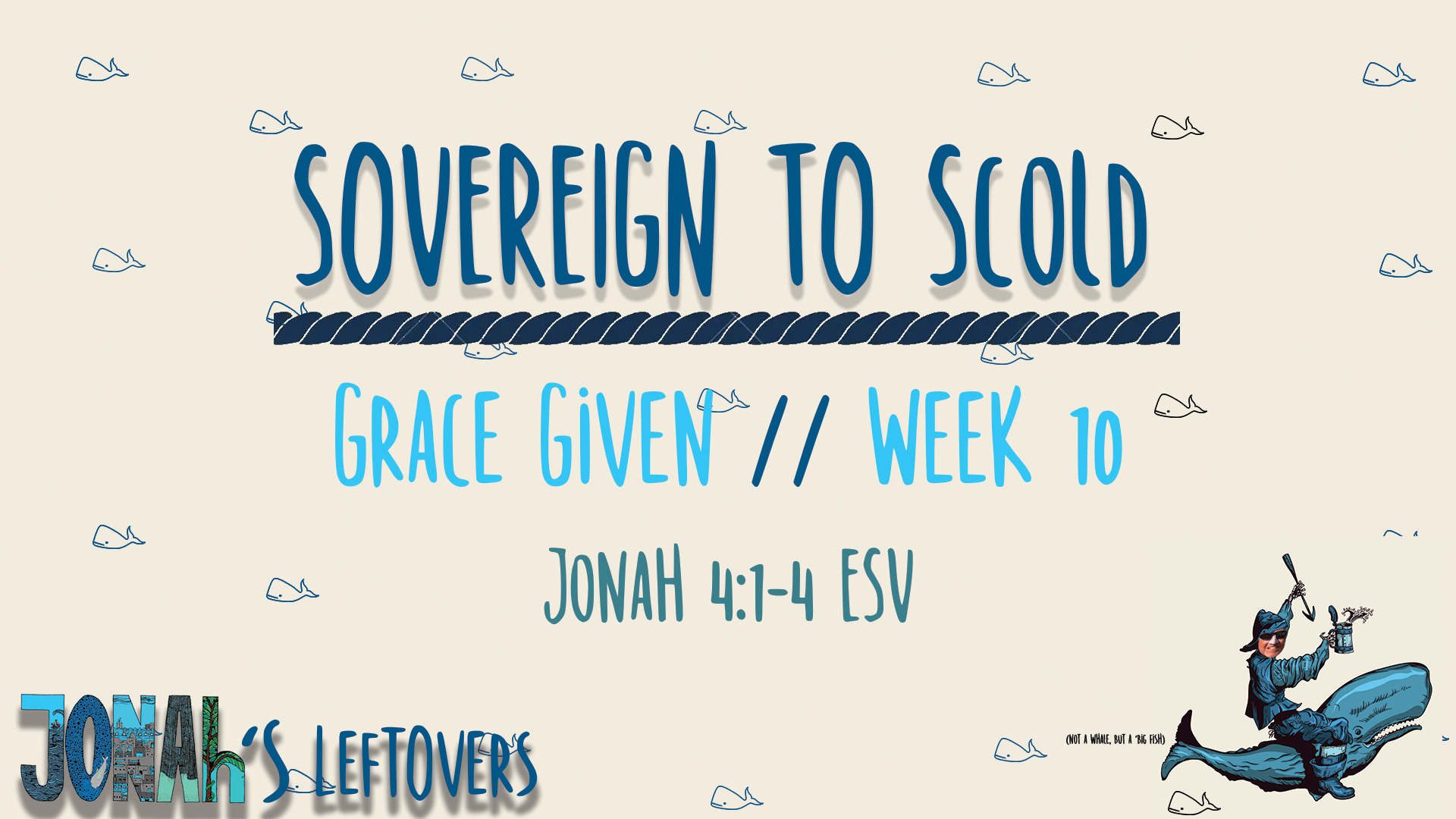Home » Jonah’s Leftovers // Jonah 4:1-4
Jonah’s Leftovers // Jonah 4:1-4

Sovereign To SCold // Grace Given
"1But it displeased Jonah exceedingly, and he was angry. 2And he prayed to the Lord and said, “O Lord, is not this what I said when I was yet in my country? That is why I made haste to flee to Tarshish; for I knew that you are a gracious God and merciful, slow to anger and abounding in steadfast love, and relenting from disaster. 3Therefore now, O Lord, please take my life from me, for it is better for me to die than to live.” 4And the Lord said, “Do you do well to be angry?” ~Jonah 4:1-4 ESV
BACKGROUND ~A Tale of 2 Hearts
Proverbs 13:12 NLT says – “Hope deferred makes the heart sick, but a dream fulfilled is a tree of life.”
I think we all know to some degree what it feels like to have our “hopes shot down,” to walk through an an unmet or even false expectation that’s not fulfilled.
When it comes to God we need a sort of reconstruction of our thought-processes that holds at least these 2 biblical mindsets together.
#1st – Our desires for the future has to run alongside a complete willingness in submission to Christ regardless of their fulfillment.
and #2 – The goal cannot be the white picket fence or whatever it is at the “end of the rainbow,” that our desires lead us to dream. The goal is always in glorifying God regardless of whether the picket fence ever shows up or not.
Our friend Jonah’s living in a false expectation as he tries to fit God into his expectation, instead of basing/bringing His expectation to God.
But he will soon learn to find out that, “God cannot be tamed on the leash of our expectation.”~ David Platt
pt.1 ~Jonah's Heart
VERSE 1
But it displeased Jonah exceedingly, and he was angry.
Jonah's Angry at God's Mercy
Righteous V un-righteous anger
This change of plan—(at least from Jonah’s perspective) for God to turn from wrath to relent causes Jonah to lose his temper and he’s “un-righteously,” angry.
So, what’s the difference? Well, a “righteous anger,” is rooted really in the heart of God. This might be that emotion you feel when God’s standard of justice isn’t met – – it’s injustice, it’s something that’s perceived as morally wrong. An “un-righteous anger,” on the other hand is usually rooted in in our hearts desires but not necessarily God’s.
Or think of it in this way:
God’s anger is always controlled, as you never see God just “fly off the hinges,” because God doesn’t lose His cool.—Our anger on the other hand can be and is often un-controlled. God’s anger, a righteous anger as the purpose or goal – – is usually restorative by nature.—But, our goal in anger is usually to destroy, to lash out, or to hurt. God’s anger is redemptive.—Ours is reactive. It’s selfish.
Jonah’s not just “regular angry,” but he is “exceedingly displeased and angry,” and we shouldn’t miss the intensity that’s meant here because the Hebrew word for Jonah’s “displeasure,” is “raw-ah” and it’s no mistake that it’s the same exact word that God used earlier on in Jonah chapter 1 verse 2 when God was talking about how “evil,” that Nineveh was.
Celebrating the god-wins
Have you ever met someone like Jonah, who is just incapable of celebrating the God-wins of others? They’re typically jealous, or angry, or insecure so they always either try to 1-up your victory or they dismiss it altogether. It’s fear based, it’s toxic, and it’s not of the Lord. A “God-win,” is when God is doing a work in someone else’s life around you.
Q1// Do you regularly celebrate the God-wins around you for others?
VERSE 2
And he prayed to the Lord and said, “O Lord, is not this what I said when I was yet in my country? That is why I made haste to flee to Tarshish; for I knew that you are a gracious God and merciful, slow to anger and abounding in steadfast love, and relenting from disaster.
Jonah's Explains His Anger At God
Jonah said, Jonah Fled, Jonah Knew
Jonah has literally just preached to the toughest audience in his entire preaching career – essentially he’s preached to a terrorist state and they have responded positively down to the very last person – – Why in the world would he have this epic melt down…well, He actually explains for us his anger toward God’s mercies.
We finally get some insight here, into what’s been going on in the mind of Jonah in the very beginning of the story of Jonah…
And Jonah in v.2–says 3 things he goes – I said, I fled, and I knew.
Jonah said
This prayer description isn’t just that he’s “saying,” these things, but that he’s “yelling,” these things at God. Jonah’s essentially trying to give God the “I told you so,” here.
He’s saying, “God didn’t I “say” this is what you would do the whole time?! I KNEW you weren’t going to just smash Nineveh with your wrath, but you were sending me to preach and to tell them to repent and then they might repent and I’d look like a fool.”
Partly here in Jonah’s mind, not only does the prediction He gave NOT come true– making Jonah “look bad,” in front of his prophet peers but also and the bigger picture is that Jonah believes God should’ve judged the enemy of Nineveh with wrath and NOT mercy…and Jonah’s angry. Jonah’s angry because God has given mercy to repentant sinners in Nineveh rather than following through with the destruction Jonah’d preached about.
~~Talk about missing the forest for the trees – – -It’s like, “But Jonah man….what if God would’ve treated you the way that you wanted God to treat the people of Nineveh?…and if He’d just said, “Sorry Jonah, this storms gonna take you out. Sorry Jonah you’re actually just gonna drown. Sorry Jonah, you’re gonna be eaten by the fish. Sorry Jonah I’m sending someone else.”
Thank God for His grace!
Jonah Fled
Jonah’s heart in the text goes on to reveal why He fled in the first-place, saying, “That is why I made haste to flee to Tarshish;”
Jonah’s shouting at God going, “This is the whole reason I left to begin with!”
Jonah Knew
Jonah’s saying that He left because He knew God’s nature. “for I knew that you are a gracious God and merciful, slow to anger and abounding in steadfast love, and relenting from disaster.”
Jonah said, Jonah fled and Jonah knew.
Jonah’s going, “God I know your nature. I knew this was gonna happen. And here’s the real problem God: You’re just too nice to people! Your heart isn’t harsh, your heart is to help!” and I can’t handle it. I knew that you‘d relent from doing them harm.”
Jonathan Swift wrote a verse that expressed Jonah’s mindset here and he put it as Jonah saying it like this: “We are God’s chosen few, All others will be damned; There is no place in heaven for you, we can’t have heaven crammed.” This is Jonah’s heart.
It’s NOT that Jonah doesn’t know who God is, Jonah just doesn’t like what God does. Jonah has taken his false expectations, for God’s will, and Jonah’s trying to fit God into Jonah’s will…and that NEVER works!
Jonah's Heart - mis-quotes Scripture
Now, what perhaps you didn’t pick up from Jonah’s prayer is that when Jonah begins to rebuke God He quotes God’s own words, back to Him— in an attempt to justify his own feelings. As he says, “for I knew that you are a gracious God and merciful, slow to anger and abounding in steadfast love, and relenting from disaster.”
Now, this was a really common way to talk about God (Numbers 14:18/Neh.9:17/Ps.86:15). But, the 1st time we read this in our Bible is at a conversation between Moses and God at Mt.Sinai – in Exodus 34:6-7a….and here’s how that conversation went, “6 The Lord passed before him and proclaimed, “The Lord, the Lord, a God merciful and gracious, slow to anger, and abounding in steadfast love and faithfulness, 7a keeping steadfast love for thousands forgiving iniquity and transgression and sin,”……
And Jonah in his quote stops right there, he somehow “conveniently,” ignores the second half of the Exodus statement, that says– “7bbut who will by no means clear the guilty, visiting the iniquity of the fathers on the children and the children’s children, to the third and the fourth generation.”
Jonah intentionally leaves out this portion where the holiness of God always brings justice to the guilty as He says that they will be punished generation after generation. Jonah does this I believe because it doesn’t fit Jonah’s expectations.
Jonah's Heart - Misunderstands "Covenant-Love"
It’s super interesting to me that Jonah opens up his prayer from verse 2 appealing to “Covenant.” As he prayed, “Yahweh,” (LORD) which hasn’t shown up since chapter 2 for us, but now Jonah literally invokes the “personal covenantal name of God,” a name that He’d revealed only to his people Israel. And so it’s the Covenant of God w/Israel that’s on Jonah’s mind here.—The Covenant btw (just to remind you) is that the Lord had promised to preserve Israel and accomplish His purposes in the world through them.
And so Jonah’s wrestling with, “But, how can God keep His promises to uphold His people and at the same time show mercy to his peoples enemy? How can God claim to be a God of justice and allow such an evil and violent people go unpunished?!”
In Jonah’s mind the issue seems to be theological because there seems to be a contradiction between the justice of God and the merciful covenantal love of God. See, Jonah knew that God loved Israel and that God extended His mercy to His chosen people; and he felt, in the very marrow of his bones, that this special love of God should NOT be extended to gentiles, let alone evil gentiles like the ones that lived in Nineveh.
Remember Jonah said, and he fled, and he knew ….and Jonah didn’t want to obey God’s command to warn Nineveh because he feared that the people there would actually repent! He feared that God would forgive them. Jonah falsely expects that God’s divine mercy was somehow the exclusive right of Israel. But, that’s not who our God is.
Jonah's Heart - He was a good patriot
By all cultural standards, Israel would’ve looked at Jonah and thought, “Jonah is a good patriot!”And while loving your country and loving your people is a really “good thing,” it can also become a “god thing,” and when that happens it’s a real “bad thing,” because it’s a “sin-thing.”
As a missionary of God, sent by God– Jonah should’ve been stoked that the Ninevites had taken their first step in faith toward God. Jonah should’ve prepared to help them continue down this path of obedience by teaching them about the character of this God. Instead Jonah was furious that they’d even began to move toward God and that God actually gave them grace. Jonah still felt that to some degree mercy had to be deserved and these people did NOT deserve it (because His message for Nineveh was about Law and not Grace).
Jonah's Heart - Law & Grace
“Law for them!, but grace for us!” This systemically is how religious people operate. They’ll go, “Here’s all the rules and the laws and I’m gonna use em’ like bulldozer to run you overs or as a hammer to pound you to “Straighten you out,” because it’s law for you.”—But, when they “break the rules,” so to speak (and we all do this says Romans 3) They’ll go, “Yeah I broke the rules. But grace for me? I’m a really good person though. Don’t judge me. Nobody’s perfect. Amen brother?”
We’ve all got a lot of empathy, and capacity for ourself, but when we don’t have it for anyone else that’s a real heart problem. And what God is trying to show Jonah and us here, is that He has empathy, and grace and love, and mercy and compassion for everybody, who’d come to Him and not just people like you and me.
Anne Lamott once said, “You can safely assume you’ve created God in your own image when it turns out that God hates all the same people you do.”
It’s Jonah’s false-expectations, that’s driving this misapplication of his theology. Jonah’s sin was grounded in a correct view of God, (Yeah the Lord is gracious and good and merciful) but, He left out the other half and it was then grossly misapplied.
So, just as Jonah we must too be careful not to allow our own expectations and perceptions and predispositions and traditions to drive our theology –but instead bring those things under God first.
DANIEL ADDO adds to this saying, “The Big Question of the book of Jonah is: Are you comfortable with the fact that God loves your enemies?“
See, Jonah had Gods word, but He didn’t have God’s heart.
VERSE 3
Therefore now, O Lord, please take my life from me, for it is better for me to die than to live.”
Jonah's anger reveals his heart (take my life)
Jonah’s going, “So God if you won’t kill ALL of Nineveh, would you just kill me instead because I’m better off dead than I am alive if I’ve got to live w/this!”
When you read this, the statement itself isn’t funny at all – – but the context is because Jonah’s being super over-dramatic here. Imagine, just the very thought of the repentance and salvation of the people of Nineveh was so painful to Jonah that he would have rather died than to think about it. This is the reason that Jonah fled in the first place – not out of the fear that he’d be ineffective, but from the fear that he would be effective!
As he says “I want to die,” (V.3) Jonah’s not just perplexed by this “theological conundrum,” that he’s in but we see that Jonah’s real problem at the deepest level was his own heart.
Tim Keller says this on theological issues, “perhaps we could say that ALL theological problems play themselves out not just in our intellect but in our commitments, desires, and identities.”- That’s our hearts.
I think what v.3 teaches us maybe more than anything else is that sometimes we create our own heartbreak through our own false expectations. Because look, anytime you ever come to God say, “I won’t serve you, God, if you don’t give me _____,” fill in the blank—whatever it is, whatever your expectation is. Then the truth is that whatever you “filled in your blank w/,” that’s your real god.
VERSE 4
And the Lord said, “Do you do well to be angry?”
pt.2 ~ God's Heart
God responds to jonah w/grace
A Gentle challenge from God
Jonah’s got an idol in his life and its filled him with some false expectation. And instead of Jonah turning to God with his anxiety and trusting in Him (as we see many of the psalmists do in the scriptures) he turns against God. He blames God.
So as Jonah has oust’d himself as being upset/angry with God’s mercy, and he’s fully laid out his own expectations on the table… finally YHWH replies back to Jonah with a question of His own in a remarkable gentleness.
God quietly rebukes Jonah with a question, saying: “Jonah, is it ‘right’ for you to be angry w/me about this? About anything?” ‘What’ do you have to be angry about?”
Notice here: Where Jonah’s tone in his question is loud, God’s tone in his response is soft. Where Jonah’s criticism is un-righteous, Gods is righteous. God’s going, “Jonah you can yell at me if you want to, but I won’t yell back.”
And this is God’s heart. The Lord God confronts His prophet in his wrongs. And God doesn’t dismiss it, and He doesn’t slide it under the rug but He instead speaks the truth in love to Jonah.
SUMMARY
Have you downloaded The app?!
Check out your unique God-wiring
CHURCH IS MORE
than sunday

Jonah’s Leftovers // Jonah 4:10-11

Jonah’s Leftovers // Jonah 4:5-9


